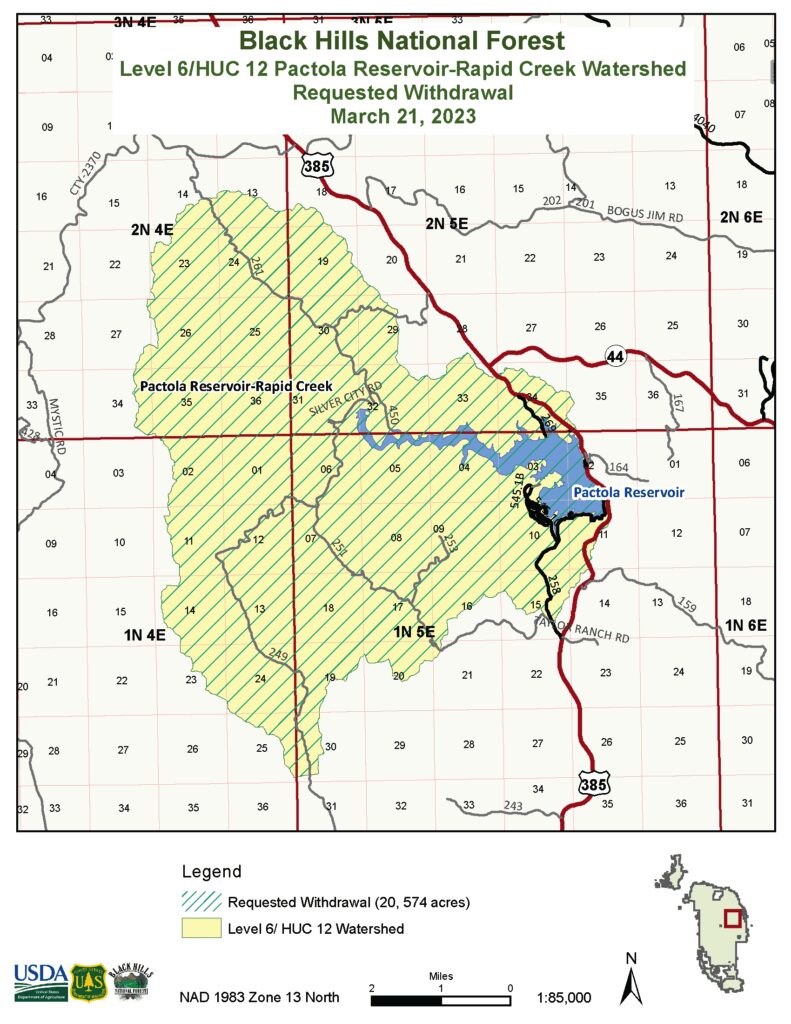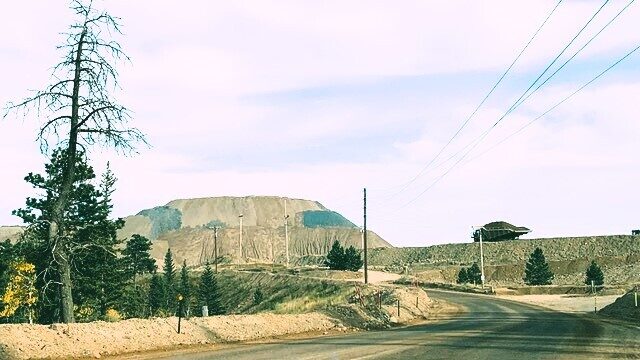
The 800-acre Pactola Reservoir is the largest and deepest in the Black Hills, with 14 miles of shoreline. Besides being a critical source of water for Rapid City and Ellsworth Air Force Base, it is a recreational destination for thousands as well as an important habitat for many species. (Photo credit/ Talli Nauman)
Black Hills water protectors are urging the U.S. Forest Service to fast-track its proposed 20-year moratorium on new mining claims around Pactola Reservoir. Advocates, noting the public comment period has been delayed a week, say they want the ink dry before the January 2025 change of presidential administrations. Comments now are due by Monday, Oct. 28 on the plan that would withdraw 20,574 acres from drilling access in the watershed sustaining South Dakota’s second-largest urban area, Rapid City.
The push to protect these sacred lands comes in the aftermath of U.S. government 1868 Fort Laramie Treaty violations. Allowing gold miners to flood into the Black Hills broke the promise to leave the territory to the Lakota people “in perpetuity.” The Supreme Court confirmed this as a constitutional violation in 1980, offering the Lakota monetary compensation, which they refused, maintaining that the Black Hills are not for sale.

“This is one of the relatively few times when we get to comment in favor of a Forest Service action, so let’s go all out!” wrote the staff of the Black Hills Clean Water Alliance on its website. The Forest Service customarily sides with industry on mineral permits due to the 1872 Mining Act.
“Ask them to expedite the withdrawal proposal to the Secretary of the Department of Interior!” the organization’s staff posted. The group hopes Interior Secretary Deb Haaland will approve the moratorium this year, “before the newly elected president is sworn in,” Lakota board member Carla Rae Marshall told Buffalo’s Fire.
“This decision is crucial for protecting the environment, honoring tribal treaty rights, and safeguarding the region’s natural resources.”
Sarah Johnson, concerned citizen
The alliance is among about three-dozen Native and local organizations that are resisting pressure from an onslaught of claims in what they call “the Modern Gold Rush.” Another organization, Rapid Creek Watershed Action, launched the “2024 Comment Challenge” with an ambitious goal of generating 2,024 submissions. As of Oct. 22, they counted more than 700 responses, most in favor of the proposal.
The coalition called the Forest Service proposal a major victory after decades of organizing, beginning in the 1970s. This comment period is the penultimate step in the federal process that began in March 2023 when the Forest Service responded to community action by asking the Interior Department’s Bureau of Land Management for a so-called “mineral claims withdrawal.” It aims to prevent mine waste from sullying the water vital for municipal consumption and the supply of Ellsworth Air Force Base, the area’s largest employer.
The group hopes Interior Secretary Deb Haaland will approve the moratorium this year, “before the newly elected president is sworn in.”
Lakota Black Hills Clean Water Alliance board member Carla Rae Marshall
An initial 90-day public comment period opened floodgates to more than 11,000 comments, 85% in favor. Hundreds lined up to testify at a public hearing on April 26 – only two of them against the proposal and in favor of mining claims.
The Forest Service issued a draft Environmental Assessment and Finding of No Significant Impact earlier this month. The agency expects to make a decision by Dec. 1, according to its website.
The public can browse submitted comments here. A quick review shows some simple one- to two-sentence remarks, as well as researched responses, like that of Sarah Johnson:
“This decision is crucial for protecting the environment, honoring tribal treaty rights, and safeguarding the region’s natural resources,” she wrote. “Here’s why:
- Landback: The mineral withdrawal aligns with the ongoing movement for landback, which seeks to return ancestral lands to Indigenous peoples. This withdrawal is a step towards acknowledging and addressing historical injustices.
- Water Quality Concerns: Pactola Reservoir is a vital source of drinking water for the region. Mining activities can pose significant risks to water quality, including pollution from chemicals and sediment. By preventing mining, we protect this essential resource.
- Honoring Tribal Treaty Rights: The withdrawal respects the treaty rights of Indigenous tribes, many of whom have deep cultural and spiritual connections to the Pactola area. It recognizes their sovereignty and the importance of protecting their ancestral lands.
- Fishing Rights: The Pactola Reservoir is a popular fishing destination. Mining activities can disrupt aquatic ecosystems, harming fish populations and impacting recreational fishing. By protecting the area from mining, we safeguard the health of fish and the enjoyment of fishing for local communities and visitors.

“The Pactola Mineral Withdrawal is a necessary and responsible decision that prioritizes the health of our ecosystems, the well-being of local communities, and the protection of Indigenous rights,” Johnson concluded.
Written comments can be submitted from any location. Submit online at this link from now until next Monday. Letters can also be hand-delivered to Shawn Cochran, Forest Supervisor, at the Black Hills National Forest, located at 1019 N. 5th Street, Custer, S.D. 57730. The office is open Monday to Friday from 8:00 a.m. to 4:30 p.m. Email submissions will not be accepted.
All comments, along with the names and addresses of those who submit them, will be available for public review. The Secretary of the Interior will be responsible for this decision.
Nauman, Talli. “Lakota tribes, grassroots organizers unite against ‘modern gold rush’ in Black Hills, Buffalo’s Fire, Dec. 23, 2023.
“Mining companies rushing into Black Hills,” Black Hills Clean Water Alliance, Feb. 2, 2022
Pactola Reservoir - Rapid Creek Watershed Withdrawal, U.S. Forest Service website
Tracy L. Barnett
Contributing Editor
Talking Circle
At Buffalo's Fire we value constructive dialogue that builds an informed Indian Country. To keep this space healthy, moderators will remove:
- Personal attacks or harassment
- Propaganda, spam, or misinformation
- Rants and off-topic proclamations
Let’s keep the fire burning with respect.






